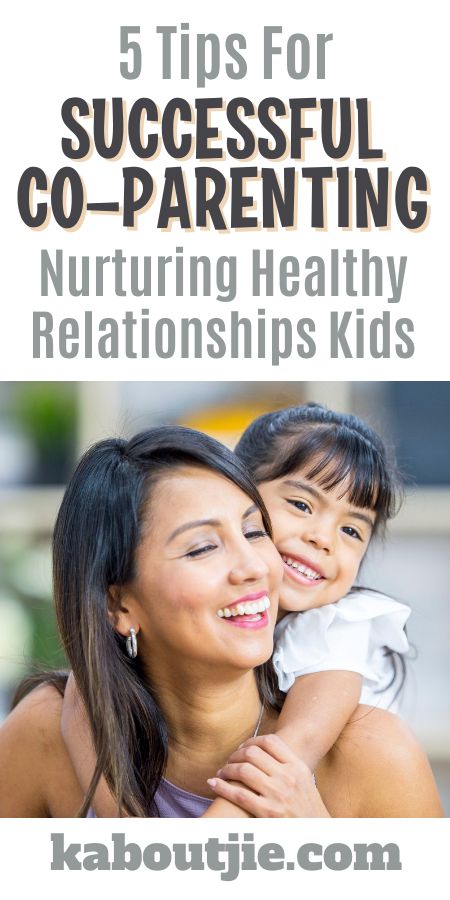When two parents decide to part ways, supporting and encouraging a continued relationship between the child and both parents is important. That way, you’re sure that the child’s needs are met. However, co-parenting can be challenging, especially when there is a bitter separation or divorce, but with the right system in place, both parents can establish a common ground to make it work. This will mean putting aside your differences and prioritising your child’s needs. This article will show you how to nurture a healthy co-parenting relationship that will benefit your child.

Consider Getting Professional Help
Divorce or separation can take a huge toll on kids, especially those with behavioural disorders like Attention Deficit Hyperactivity Disorder (ADHD). Since kids with such conditions may find it challenging to regulate their normal emotions, so they may act out much more than their peers would when they discover that they will no longer live with their parents in the same house. Such kids may even dwell on the negative aspects of the new living arrangement so much that they fall into depression or low self-esteem because they may blame themselves for their parent’s breakup. If your child is facing such a challenge, you should consider getting professional help for them. To make this more effective, you and your ex might need to be present during some appointments with the professional.
Some adults also struggle with ADHD, making it difficult for them to focus and remember things like appointments. They may even act impulsively sometimes because of their condition. Adults with such problems will likely find it difficult to cope with the new living arrangements, and they may forget appointments that are important in their kids’ lives. If that’s the case with you, consider getting professional help so that it doesn’t stop you from being the great parent you want your child to have. Mental Health Center, an addiction psychiatrist in Los Angeles, emphasizes that ”successful mental health treatment requires a unique approach for each individual.” So, the help you get should be tailored specifically to your needs.
Be Flexible, But Establish Boundaries
It is important to show your co-parent that you are willing to cooperate with them when it pertains to doing what’s best for your kids. Your child doesn’t want to pick sides and choose who they want to spend their time with. They just want the assurance that both their parents have their best interest at heart and are willing to do what it takes to ensure their well-being. So, if there’s a one-time event that your child will love, and your co-parent offers to take them to it, let them go. It might mean you are missing a few hours of time, but you shouldn’t sweat it. Although your parenting time split is written out in black and white, what really matters is that your kid has as many experiences and adventures as possible.
While trying to be flexible to allow your child to get the best of both parents, it’s important to establish healthy boundaries. If the other parent wants to be unnecessarily involved in things that concern you, calmly but firmly remind them that you are only interested in discussing things that pertain to your child. This is especially important when the relationship between you and your co-parent has just ended. Topics like who your ex is currently seeing, their family drama, or job stress, are outside your control. So you don’t need to help them fix it.

Don’t Be Manipulative
Many co-parents make the mistake of manipulating their exes through their children. The problem with this kind of behaviour is that it puts a strain on your co-parenting relationship, and your child ends up losing. For example, if you have plans for a weekend when your co-parent has custody, and you want your child involved in your plan, you may find yourself pressuring your child to support your plan. Using your child to mount emotional pressure on the other parent just teaches them that it’s Ok to manipulate people. Instead of doing this, try discussing your intentions with your co-parent to know if they will accept it.
Also, don’t fall into the trap of trying to buy your child’s love or support using gifts. You don’t want your child to master the art of manipulation to the point that they start to pit you and your co-parent against each other. Of course, your child may test you occasionally to know if they can have things their way. In such a situation, what they need is reassurance from both parents that you uphold honesty and do not support manipulation in any form.
Set Consistent Discipline Standards in Both Homes
Many times, parents who are divorced or separated become fearful of disciplining their children to avoid losing their love to the other parent. This is especially the case when one parent has limited visitation because they can’t imagine seeing their child look unhappy during the few hours they spend together. Sadly, when a child isn’t taught the rewards of good actions and the penalties for bad behaviours, they may not appreciate the importance of making good choices. Children who grow up this way may take the liberty of hurting others without caring since they’re used to getting away with anything.
It’s crucial for you and your co-parent to set and maintain similar discipline standards in your individual homes. That way, you won’t find yourself invalidating your co-parent’s discipline choices. Undermining the other parent’s authority is harmful to your child. You don’t want your little one ignoring the other parent’s instruction if they’ve warned them not to open the door to strangers.
Allow Your Child To Have A Loving Relationship With Your Co-parent
No matter how you see it, children need a loving relationship with their parents. So, you should avoid badmouthing your ex to your child or venting about them on social media. Your child benefits significantly from experiencing you and your ex in a positive relationship. It gives them a sense of security and comfort.
 Kaboutjie SA Mommy Blogs by Lynne Huysamen
Kaboutjie SA Mommy Blogs by Lynne Huysamen





Co-parenting is not easy at times it needs both parents to have a mutual understanding to keep peace for the sake of the children.
100% and it is so sad to see when parents are unable to put the children first, I’ve seen some devastating fights between parents where the kids suffer when the parents get divorced.